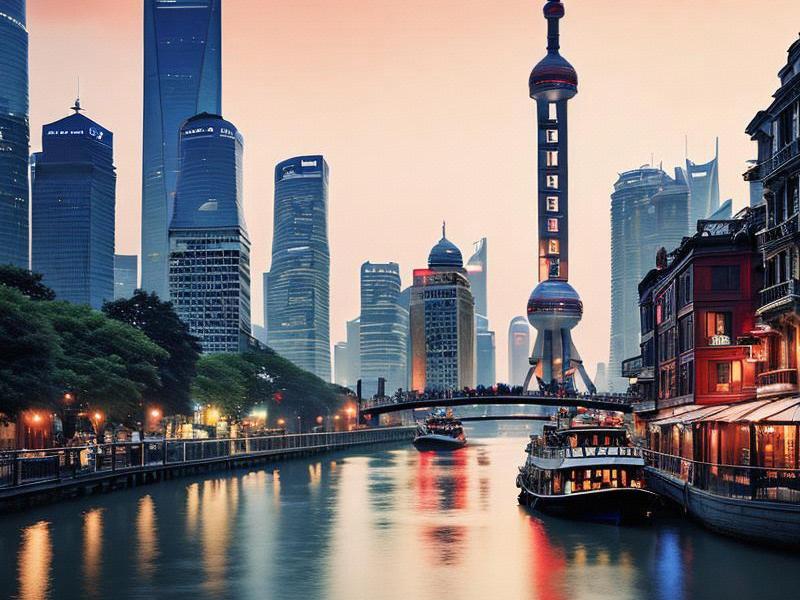
Shanghai, a city that has long been a beacon of China's modernization, stands today as a testament to the nation's rapid economic growth and urban transformation. As one of the world's most dynamic cities, Shanghai is not only a major economic hub but also a vibrant cultural center and a key player in global affairs.
The story of Shanghai's rise to prominence is one of resilience and reinvention. Once a modest fishing village, it evolved into a bustling port city by the mid-19th century, thanks to its strategic location at the mouth of the Yangtze River. This natural harbor facilitated trade and commerce, drawing merchants from around the globe. The opening of the Treaty Ports in the late 19th century further cemented Shanghai's status as a cosmopolitan city, with a mix of cultures, languages, and traditions.
In the 20th century, Shanghai became synonymous with modernity and progress. The Bund, with its iconic skyline of colonial-era buildings, stands as a reminder of the city's historical significance. However, the 1949 revolution marked a turning point, as Shanghai underwent significant changes under new governance. Despite these challenges, the city's spirit of innovation and adaptability remained unshaken.
The economic reforms initiated in the late 20th century brought about a new era for Shanghai. The establishment of the Pudong New Area in the 1990s was a masterstroke of urban planning and economic strategy. Pudong, once a rural area, has since transformed into a futuristic cityscape, home to the world's tallest buildings, including the iconic Oriental Pearl Tower and the Shanghai Tower. This rapid development has positioned Shanghai as a global financial center, rivaling cities like New York and London.
上海龙凤419自荐 Shanghai's economic success is not confined to its skyline. The city boasts a robust manufacturing base, a thriving service sector, and a vibrant startup ecosystem. It is a key player in international trade, with the Port of Shanghai being the busiest container port in the world. The city's strategic location and well-developed infrastructure make it an ideal hub for global commerce.
Urban development in Shanghai is a story of balance between modernity and heritage. While the city has embraced cutting-edge technology and architecture, it has also made concerted efforts to preserve its rich cultural heritage. The Yu Garden, a classical Chinese garden, and the French Concession, with its charming cobblestone streets and historic buildings, are testaments to Shanghai's historical charm.
Culturally, Shanghai is a melting pot of influences. The city's art scene is thriving, with galleries, theaters, and music venues showcasing a diverse range of artistic expressions. The Shanghai International Film Festival is one of the most prestigious events in the global film calendar, attracting filmmakers and audiences from around the world. The city's culinary scene is equally diverse, offering everything from traditional Shanghainese cuisine to international flavors.
Shanghai's role in international affairs is becoming increasingly significant. As a member of the World Expo's Bureau of International Expositions, the city hosted the highly successful Expo 2010, which drew millions of visitors and showcased China's commitment to sustainable development. The city is also a key player in regional cooperation, particularly within the framework of the Shanghai Cooperation Organization (SCO), which promotes security, economic cooperation, and cultural exchange among its member states.
上海品茶论坛 The city's leadership in sustainability and green initiatives is another area of亮点成就(achievement)(achievement) that stands out (突出). (Outstanding). Shanghai has implemented various measures to reduce pollution, improve public transportation, and promote energy efficiency. The city's green spaces, such as Century Park and Zhongshan Park, provide residents and visitors with opportunities to connect with nature amidst the urban sprawl.
Education is a cornerstone of Shanghai's development, with the city boasting some of the best universities and research institutions in China. Fudan University and Tongji University are renowned for their academic excellence and contributions to research and innovation. These institutions attract students and scholars from around the world, fostering a culture of learning and intellectual exchange.
Tourism is a vital part of Shanghai's economy, with the city offering a unique blend of modern attractions and historical landmarks. The Bund and Nanjing Road are must-visit destinations for tourists, offering a glimpse into the city's rich history and vibrant present. The Shanghai Museum, with its extensive collection of Chinese art, is another popular attraction.
上海品茶网 However, like any major metropolis, Shanghai faces its share of challenges. Rapid urbanization has led to issues such as traffic congestion, housing shortages, and environmental concerns. The city government has been proactive in addressing these challenges through innovative policies and urban planning initiatives.
The future of Shanghai looks promising, with the city poised to continue its journey as a global leader. The ongoing development of the Shanghai Free-Trade Zone is expected to further enhance the city's role in international trade and investment. The expansion of high-speed rail and other transportation infrastructure will improve connectivity and accessibility, making Shanghai an even more attractive destination for businesses and residents.
In conclusion, Shanghai's story is one of transformation, resilience, and ambition. From its humble beginnings as a fishing village to its current status as a global metropolis, the city has consistently adapted to the changing times. Its economic prowess, cultural vibrancy, and commitment to sustainability make it a model for other cities around the world. As Shanghai continues to grow and evolve, it remains a symbol of China's aspirations and a beacon of hope for a better future.
